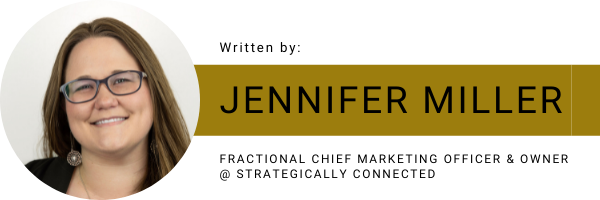.png) Jennifer Miller is a Fractional Chief Marketing Officer and Owner of Strategically Connected, a process consultant, and a Society member who believes that at the core of all organizations and processes, people are what drive change and growth in a company. Her passion for supporting companies to build scalable processes has impacted many organizations over the years, one of which received the honor of the #1 Fastest-Growing Technology company in Austin and #86 on the 2019 Inc 5000 list. She served as President of the Austin American Marketing Association Board (a national organization focused on connecting and developing marketers) during the 2020-2021 Board Year winning the national “Turn It Up Chapter of the Year” award against 70+ chapters. Jennifer embeds herself into the lives of the companies she works with to help them in very intentional and strategic ways. She believes that every problem is "figureoutable," and she strives to help bring simplicity to complex situations. Continue reading for her thoughts on how the core tenets and skills of process consulting intertwine with her work in the world of marketing.
Jennifer Miller is a Fractional Chief Marketing Officer and Owner of Strategically Connected, a process consultant, and a Society member who believes that at the core of all organizations and processes, people are what drive change and growth in a company. Her passion for supporting companies to build scalable processes has impacted many organizations over the years, one of which received the honor of the #1 Fastest-Growing Technology company in Austin and #86 on the 2019 Inc 5000 list. She served as President of the Austin American Marketing Association Board (a national organization focused on connecting and developing marketers) during the 2020-2021 Board Year winning the national “Turn It Up Chapter of the Year” award against 70+ chapters. Jennifer embeds herself into the lives of the companies she works with to help them in very intentional and strategic ways. She believes that every problem is "figureoutable," and she strives to help bring simplicity to complex situations. Continue reading for her thoughts on how the core tenets and skills of process consulting intertwine with her work in the world of marketing.
The worlds of marketing and process consulting link in a thousand tiny ways, but no commonality is more evident than each field's dependence upon deep, active listening. Think of those insidious online ads following you through cyberspace – how did the Instagram deities know that this gadget, jacket, or leather-bound journal is the exact thing you now want on your Christmas wishlist? Well, they've been "listening."
This virtual and automated listening can sometimes allow for a personalized touch, but there is nothing more significant than YOU taking the time to truly listen to your customers. The listening necessary to form and maintain effective customer engagement is of the deepest and most comprehensive sort, and it focuses on authentic connection and the identification of genuine needs. This connection happens externally with the company's target audience and competitors, and internally with its employees and culture.
In my work with clients, ranging from financial organizations to software companies and beyond, my focus is consistently on encouraging and growing a company's connection to and comprehensive understanding of its context. It is so easy for a new company to swoop in, make assumptions about their customers' wants, and forge ahead with its own roadmap instead of pausing to listen. My task often focuses on helping shift a company's message to potential customers from "Here's what you need and why" to initial questions like, "What goals and challenges are keeping you up at night?" Once that real conversation has occurred, customers can draw to a service or product that is genuinely the thing they want or need.
As I mentioned above, this comprehensive, contextual listening needs to occur in both an organization's internal and external realms. Companies often forget that the practices of internal communication, culture-building, and employee engagement are marketing. Employees are the first point of contact, and a holistic picture cannot be constructed without dialogue with the front-line employees. What could be more engaging than employees who feel heard and acknowledged, whose experiences with customers are taken into account, whose opinions are considered in the making of high-level corporate decisions, and who are therefore more likely to be fully invested in and live and breathe the company mission and mindset?
It is also worth noting that comprehensive external listening should not be limited to a customer base alone; companies often need to be reminded of how valuable it is to listen to and engage with potential competitors deeply. My questions for my clients often are: What is their impact? How do you relate to them? What are your differentiators that make you special and unique? As a process consultant, I work to understand that differentiation and encourage my clients never to stop reevaluating their place in relation to competitors.
The process consulting principle of listening adaptively is also vital in the constantly changing world of marketing. Technology and platforms are constantly updating, consumer culture swings this way and that, and customer reactions can surprise you time and time again. Processes have to be built in ways that encourage quick readjustments, with methods and campaigns constantly tested, tweaked, and iterated upon.
At the end of the day, marketing is all about people - understanding people, seeing challenges through the eyes of customers and employees, and supporting growth through adaptability. Approach today a little differently –
- How can you seek understanding first?
- What questions can you ask before assumptions?
- Where can you creatively adapt to chaotic situations?
"The aim of marketing is to know and understand the customer so well the product or service fits and sells itself." - Peter F. Drucker
